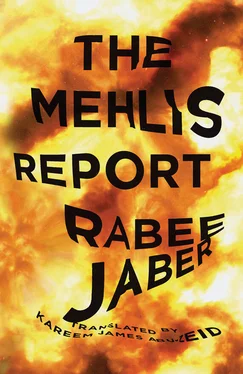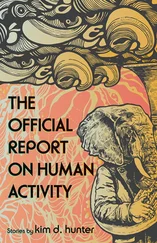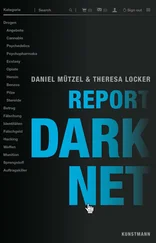He swims for a full hour at the indoor pool of the Phoenicia Hotel. He takes a shower, and as he’s drying himself off realizes he forgot his deodorant at home. His muscles are trembling: a lovely feeling. He can swim more later. His father used to swim like a fish. And his grandfather used to go swimming in the sea in winter whenever the water was calm. He swam in the cold, and when he got out he always laughed at his chattering teeth. Mary’s a swimmer. And Emily too. Josephine was quicker than he was over a hundred meters. She still swims with him in his dreams. People used to think they were twins — her face looked strangely like his. But she was one year older. If she hadn’t left the house that day long ago, if she were still alive, how old would she be right now? 41. There are countless pictures of Josephine in the family photo albums. She loved having her picture taken. She was kidnapped on the demarcation line between East and West Beirut, at the crossing by the National Museum. That was all they ever found out about her.
He walks along the Manara corniche, near the old lighthouse, and looks at the sea. The place isn’t too crowded: night hasn’t fallen yet. At the edge of the path, men are dropping hooks into the sea. Fishing lines tied to blue handrails. A boy on a bike. Someone selling cakes with sumac and thyme. A man pushing a cart with bags of pistachios on it. There’s a big pot on another cart, the smell of fava beans wafting from it. Lemons are lined up, yellow and glistening, in front of the pot. Women are walking, their steps large and slow, their hair covered by head scarves. A cart laden with boiled cobs of corn. Steam rises over some men: a heated discussion. They’re talking politics. About what’s happening in the country. Mehlis is in Geneva to meet with Kofi Annan, but he’s coming back to Beirut tonight. Has he written the report? No. He hasn’t written it yet. A sea breeze starts up. There’s a strange smell in the air. He stops breathing in through his nose and quickens his pace. He should turn around and head back. If he walks anymore he’ll start sweating again. He’s walked and swam enough. He doesn’t want to wear himself out. He notices the people seem tense. Because it’s Ramadan. This is West Beirut: the people fast here. They’ve gone without food and drink from the morning till this very instant. That’s not easy.
He goes into McDonald’s to buy a half-liter bottle of water, and drinks it as he stands there looking through the window at the corniche and the cars and the sea. The time of the iftar meal is approaching. You can see it on the faces. In the way people are moving. He glances at the clock and walks outside again. The water has refreshed him. His body needed it. He can tell because he felt some tension in his eyes. It felt as if the muscles in his sockets had been contracting. He rushes across the road in front of the Phoenicia Hotel. The cars are coming out of the tunnel very quickly. He passes by the cylindrical pink hotel (the Monroe) and walks down Ahmed Shawqi Road, his gaze directed upward to the new hotel rising beyond the row of palm trees. Another cylindrical hotel, but in a different style: its summit resembles the sail of a ship. He once spent two nights in the Burj al-Arab hotel during a business trip to Dubai. He woke up early — he was used to sleeping in his own bed in the house on Ghandour al-Saad, with his head on his own pillow — and opened the blinds, and from the broad window he looked at the white sea stretching out before his eyes. It was like sleeping in a tower that rose from the heart of the sea. He had felt the same thing in a hotel in Marseille (the Radisson Blu). What’s keeping him in Beirut? Why doesn’t he leave for France, or Baltimore? What’s keeping him in this city? But he knows these paths so well. He’s lived his whole life here. He never once traveled far from Beirut without feeling as if he’d left half of himself behind, as if he were split in two. Half of him moving on the streets of New York or London or Tokyo or Lyon, and the half back in Beirut waiting for the rest of him. The half that moved through foreign cities was and was not happy. And the half waiting in the first city — in the house on Ghandour al-Saad — was neither happy nor unhappy. It was simply waiting. It wasn’t moving. It kept still, as if it were looking at a TV that had been turned off. It kept still as the days and nights went by, still as a plant, like a seedling waiting for someone to bring it water.
His colleagues all left. His relatives left. Mary left. So did Emily. His friends are planning to leave, and Yara wants to leave and never come back, provided she can find a country that will take her. Why is he clinging to these streets, why is he holding onto this city? What’s keeping him here? Salty humid air rustles through the palm trees. A friend of Emily’s (Claudette Saadeh) wrote her dissertation at the Sorbonne on the emigration from Mount Lebanon in the final decades of the 19th century. She noted that all the school books and Lebanese historians put forward a single theory: the mountain was poor, and the people needed money once the silk manufacturing trade there started to lose ground; and the need for money — for gold — drew the Lebanese overseas. Emily’s friend claims this theory overlooks one important factor: the civil wars around Mount Lebanon in the middle of the 19th century. The sectarian wars wrecked the villages there and led to foreign intervention, and ultimately to the setting up of the Mutasarrifate administration. During the Mutasarrifate era, there was peace on Mount Lebanon. And it was during this time of peace that the massive emigration to America and Africa began. The schoolbooks don’t mention this, but it’s important. People don’t leave their country in a time of war. First of all, it’s not easy to gather up your belongings and move to a far-off country during a war. Second, war breaks out as quick as lightning and doesn’t leave any room for thought. Third — and this is strange — people are able to acclimate themselves to war. In moments of extreme danger, glands in the brain are activated, triggering chemicals that help you face danger. Endorphins are one of those chemicals. There are scientists in America who have developed drugs for military use, drugs that block the soldiers’ fear of death during battle. Emily said her friend did a lot of research on those chemicals, and on those drugs. When you eat chocolate, you feel strength in your whole body. The same is true of hot peppers. It all comes from endorphins. Saman recalls his French doctor, who recommended that he exercise: he said walking quickly was better than running. The people of Mount Lebanon didn’t leave during the civil wars. They left in the time of peace that followed those wars. Why did they leave? Emily’s friend says it was fear. One’s fear of the future is greater after a catastrophe. Something similar happens after earthquakes. People are afraid of dark days returning. Fear is the main reason behind emigrations like these. Fear, and a loss of confidence in the place. If these places can burn down so quickly, virtually overnight, then how could you not be afraid? Rumors spread in the wake of wars, and so do nightmares. Lebanon is the largest market for antidepressants in the whole Middle East. Emily’s friend lives in Montreal now. She’s writing a book on the exodus from Beirut after the Civil War of the last quarter of the 20th century. The figures she has compiled show that almost a quarter of Lebanon’s population left the country for America, Europe, and Australia after the end of the war in 1990. Saman Yarid washes his face in the water of the fountain beneath the Government Palace.
It’s crowded in front of the ESCWA building. In the neighboring large public park, Gibran Garden, the tent is still standing: the families of the missing maintain their vigils here. Old women hold pictures of the missing: children and grandchildren and siblings and spouses who were lost at the end of the war. Fifteen years have gone by and the missing still haven’t come back. The old women are sitting on a bench beneath a small tree, its shadow still quite short. One of them is opening a package of bread. Another is opening a can of “Zwan” brand mortadella. The photos are up on a wooden board, and on the tent poles, and at the entrances to the tent, and inside the tent too. There are a lot of pictures here: a young man with long hair and sideburns wearing a white shirt with a high collar; a man laughing; a boy who looks about seventeen giving the victory symbol with his fingers; yellow photos whose color has faded.
Читать дальше












